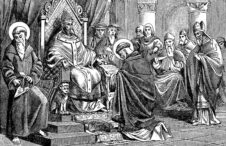Most of what is sung during the Mass is prescribed by the Liturgy. Some things, however, are discretionary. The liturgy often suggests which settings can be used for the Commons. This particular Sunday, July 18th, the Eighth Sunday after Pentecost, was a Second-Class Feast. This gives us the possibility to choose from among the following:
- Mass IV (for Ordinary Feasts)
- Mass VIII (for Second Class Feasts)
- Mass XI (for Sundays throughout the Year)
How to decide? It’s fairly arbitrary and it often comes down to personal preference. This Sunday, the matter was decided based on the personal preference of a visiting priest. Father explained that he seldom gets to sing the Mass and he asked if we could do Mass VIII. We were happy to oblige, and he did a wonderful job on his “bit parts”.
We sang Hail, Jesus, Hail as the processional hymn, in honor of the Precious Blood, during this, the month of the Precious Blood.
Of course, at the offertory, we sang Stella Coeli Extirpavit, once again imploring Our Lady to beseech her Son, in our behalf, to end the current pestilence.
Friday was the feast of Our Lady of Mount Carmel, and so, somewhat out of the ordinary, we sang a Marian hymn at the Communion, a hymn that comes to us from the Carmelites, the lovely Salve Mater.
We still had two problems to solve. Of course, we want to honor Our Lord in the blessed Sacrament at the Communion. And we would want to honor Saint Bonaventure as well, since his feast was last week. But there are no hymns by him nor about him in our hymnal. In fact, when it comes to hymns, poor Saint Bonaventure is quite literally an also ran. In 1264, Pope Urban IV instituted the Feast of Corpus Christi. He asked Saint Thomas Aquinas and Saint Bonaventure to each write a Mass and office especially for this new feast, and he would choose between them.
The two saints went together to present their compositions to Pope Urban. Saint Thomas went first and knelt before the Pope to read what he had written. Both Urban and Bonaventure listened tearfully to Thomas’s Mass and office. In his great humility, Bonaventure tore his manuscript into small pieces and conceded the contest to Thomas. It is this Mass and office that we use to this day for the feast of Corpus Christi.
Thus, at the communion, to honor Our Lord in the Blessed Sacrament, and also to pay homage to Saint Bonaventure (albeit very obliquely), we sang Tantum Ergo, which was composed by Saint Thomas Aquinas.
In view of the recently released Motu Proprio that restricts the use of the Traditional Latin Mass, we sang Faith of our Fathers at the recessional.
